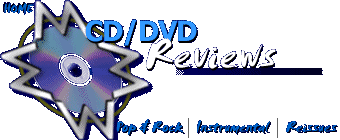 
|
||||
|
|
DAVE EASLEY |
|||
|
Featuring Dave’s varied guitar work backed up by harmony vocalist Kass Krebs, along with Alfred Uganda Roberts (frame drums, congas, auxiliary percussion), Doug Garrison (drums) and Rene Coman (bass), Easley Rider is the optimal showcase for his vocals, steel guitar, bass, frame drum and more. The album also features a cool instrumental called “Weed Eater Wars” that features Dave cutting loose on steel guitar, steel sitar and an instrument he calls ‘weed eaters’. For those that like their electric pop-rock a little left of center, Easley Rider makes a solid introduction to the art and craft of singer-songwriter and guitarist extraordinaire Dave Easley.
Recorded on January 7th, 2016, Byways Of The Moon was finally released on black vinyl record and digital download at the end of 2021. The 6-cut album clocks in at 43-minutes and takes the listener through a range of musical moods including jazz, rock, fusion and more. Covers of Miles Davis, Brian Wilson, Jimmy Page, John Coltrane and more, mix things up in an instrumental soundscape where Dave’s pedal steel guitar is king. From the rocky, folky sound of Easley Rider and A Time Of The Signs to the all-instrumental pedal steel fusion of Byways Of The Moon, New Orleans-based Dave Easley covers a whole lotta musical ground with his unique and electrifying approach to modern music.
mwe3.com presents an interview with
Dave Easley: I was born in Hilo, Hawaii in 1958. I moved to Champaign, Illinois at an early age. On the first day of Kindergarten I still had a Hawaiian accent and couldn't understand why the whole class started laughing when I talked. I lived in Geneva, Switzerland for a short while when I was 9. As a young man, I briefly attended the Berkeley School of music in Boston but they didn't accept pedal steel as a principal instrument so I returned to Illinois and then eventually wound up in the New Orleans area. It's a nice sized community for me. My general idea is that very large cities tend to be geared more towards specialization. As a freelancer, I find it interesting to play free form jazz gigs, blues gigs, Zydeco, Cajun, jazz standards, originals... I enjoy the variety. I don't have to specialize. And, in a homogenized age, this area still has a regional sound, especially in the drumming. mwe3: What were some of your earliest music recollections when you were growing up? I'm 68 now so I guess you also grew up in the Beatles era right? How about your favorite guitarists and bands and what genres of guitar interest you most? Dave Easley: Definitely seeing The Beatles on that first Ed Sullivan appearance was a huge, unforgettable moment in my young life. My Dad made sure we didn't miss that. He came down into the basement where my brother and I were playing and said, "Hey, you boys should come upstairs; the ‘beetles’ are about to be on TV." He was a science educator and he loved to teach us about ladybugs and daddy long legs, and those sorts of things, caterpillars, millipedes, centipedes… and we said we'd be right up to see the ‘beetles’ but we went on playing with our fire engines and building blocks. He came back down and said, "Hey, the beetles are about to start singing any minute now." We looked at each other. Singing beetles? Maybe we'd better see this. Of course we became Beatlemaniacs. Some favorite groups of mine as a young guitar player were The Byrds, Country Joe and the Fish, The Grateful Dead, Cream, The Band... From The Byrds I got into Coltrane and then sort of went backwards through jazz history from there. mwe3: Did you start on six-string guitar and then gravitate to the Steel? Tell us about the guitars you're playing on both your 2020 CD Easley Rider and the 2021 vinyl only release of Byways Of The Moon. What was your earliest guitar and guitar studies?
He and the House Rockers raised the roof that night. I rode my bike straight home, tuned my Gibson Melody Maker, my first electric guitar, to an E chord, found something to slide with and was up all night sliding away. Hound Dog had about as wide a vibrato as any slide player I'd ever seen. It's right for what he was playing. As a jazz player, I often use very little vibrato. But I'm not against it. One night Colonel Bruce Hampton called “Dust My Broom” and I felt great joy in doing my Hound Dog vibrato. When I was around twenty-one I played for a little while with Lin Halliday, who had been in the Maynard Ferguson big band. I learned more from him than I did in any music schools. It was Lin who impressed on me the importance of not doing vibrato in certain styles of jazz. As it turned out, Chad, the drummer on Byways Of The Moon, and Jeff Parker, with whom I played on the first Brian Blade Fellowship record, were also former Lin Halliday sidemen. Jeff is also on the next record I recorded with Chris Schlarb just last month. On Byways I'm playing the blue single neck C6, 12-string Excel. On Easley Rider I'm playing that Excel as well as the green Excel which has a gear shifter to switch necks. It's a double neck pedal steel with only one neck, believe it or not. It's a patented technology that Mitsuo Fuji came up with. The electric guitars on Easley Rider are a Paul Reed Smith, a Tele and a Strat. The acoustics are a Taylor, a Thin Line Taylor and an Alvarez that I got years ago from Damien Youth. mwe3: Your 2020 CD Easley Rider and the 2021 vinyl only release of Byways Of The Moon are fairly recent releases. You said Easley Rider was overlooked as we entered the pandemic. How did the 2020 2021 pandemic impact the album and were you planning shows to promote the Easley Rider album?
The one and only Alfred Uganda Roberts passed away a few months into the pandemic. He had mesothelioma. I was very proud to have him on the record. He is an important part of New Orleans music history. Alfred loved to ride his bike around New Orleans and I ride mine around here on the North Shore where I live. I was always very fond of Alfred. Everyone loved him. We used to play together in a group called Dreamland. I wrote a song for him called “Uganda”, which appeared on a CD by the group, 3Now4, called Time Ebbing. mwe3: Tell us about working with record producer Chris Schlarb on Byways Of The Moon. Tell us about Chris’ band Psychic Temple and something about his and your ideas behind Byways Of The Moon. Dave Easley: Chris Schlarb and I first became friends when I worked as a sideman on a Psychic Temple release. Over the years he would hire me to do parts from time to time for various different projects. There was one song I played banjo on. Then he came up with the idea of doing a steel guitar album. He chose a song list and the players and I really loved the choices he made on both. I would have never thought of the Zawinul / Beach Boys medley. And I liked doing a jazz take on the Zeppelin tune. Cathlene, Chad and Dave were all so wonderful and melodic. Chris has a favorite mastering guy he uses but he kept me involved in the process. He ran them by me and I had a couple of suggestions on a couple of tunes and he liked them. mwe3: Can you compare and / or separate your rock albums, say the recent Easley Rider to making the all-instrumental fusion of Byways Of The Moon? Dave Easley: I loved doing all originals on Easley Rider and A Time Of The Signs. And I loved just as much interpreting other people's music on Byways. I really feel I need to have both outlets. Although I think of Byways as a jazz album, I was very happy to have Zeppelin and the Beach Boys covers on there. It's always been in the jazz tradition to interpret popular music; Miles doing Cindi Lauper, Pops doing “Hello Dolly”, Trane doing “My Favorite Things”, etc… mwe3: I find it interesting that Byways Of The Moon was recorded and released by Big Ego Records but only on black vinyl. I realize it is also available on downloads too. Dave Easley: Chris Schlarb, the producer of Byways, almost never makes CDs. He's got a great vinyl manufacturer who exclusively does Chris's productions. Chris is a true vinyl lover. One difference is, on a CD you're not limited for time. On vinyl, you have two time limits, one on each side. I can definitely relate to Chris's love of vinyl. It's what I grew up on. I do remember though… that there was a much longer “Giant Steps” that we played that day that I liked better but there was no way it could fit on either side and still leave room for the rest of the material. I didn't have any considerations like that on Easley Rider. Each song could be as long as it wanted to be.
Dave Easley: I remember having a conversation with Daniel Lanois when we were working together on the first Brian Blade Fellowship album. He had made his career producing vinyl albums and he strongly felt that, even though the project we were doing was destined for CD, he wanted it to be as close to vinyl length as possible. I think it wound up being around 50-55 minutes. For him, the traditional 17-20 minutes per side was the ideal time for the typical human attention span. At around that same time I was working on my own CD releases which, back in those days, were clocking in at pretty near the limit for CDs. I was sort of being my own low budget record company and I was like, ok, Dan and Blue Note/Capitol can afford to be like that but I'm spending the same to have an 80 minute CD or a 40 minute CD manufactured. Give the people more for their money! But listener fatigue is a consideration. Easley Rider is a good bit shorter than my first CD productions, which probably should have been marketed as double-albums on one disk. I guess I figured people could take a break when they get tired. But one friend pointed out, "then they'll never get to the end." The tendency is to plop it in again at the beginning because you don't remember that last time you made it to song 8. And I always want to save songs that I think are really good for the end. Should you front-load a project, aimed at the booking agent or DJ? Or should you put the tunes in order like a concert? I like to lean towards the latter, like a concert for one person in an easy chair right in front of the speakers. I think Chris and I think alike in that respect except he's programming two short 3 song sets and I'm putting together one long set. mwe3: Getting back to Easley Rider, I wanted to ask about some tracks. Can you tell me about "I'm Crying" and also working with Kass on the vocals. "I'm Crying" has an interesting time signature plus the band really sizzles and sparks. What is the lyrical message about? It has a Jerry Garcia vibe to it and the percussion is amazing too.
The song seems to have relationship elements to it. "I reached into our boiling past to see if our sweet dream was done. All for nothing, nothing ever lasts. We woke up in another one." But, to me it's also touching on the fleeting nature of our time here. "All our past and future flies a mystery sky of fast blown clouds. I'm crying like the wind that crowds our sails and won't let us slow down." Well, the people we love are a huge part of our brief moment between dust and dust. Alfred's relentless, driving rhythm, to me, fits the story the song is telling perfectly and I loved his last note! Having Kass on the high harmony was really important to me. She can always come up with beautiful harmonies but that was one where I already had two non-parallel parts and you see that can make it tricky for a third part to find its way in, so I felt like I wanted to plan hers out in terms of which chord tones are we already covering and which do we need and how can that be a line of its own. That way we have 3 non- parallels going on phrasing together. So I gave her a specific part on that one and she really picks stuff up fast so it was a breeze for her. mwe3: Another favorite is "Momma Was A Jailbird". Is it based around your mother or mother's in general or anything autobiographical? Did you ever meet John Sinclair or John Lennon? What are the lyrics based on as you talked Martin Luther King right? How does HD Thoreau, Nathan Hale, Joan of Arc and John Sinclair fit into the picture? Sinclair still does radio shows right? Once you start in it's a slippery slope. Dave Easley: My mother passed away in 2019. I was going through a pretty tough grieving period. The local paper in Champaign or Urbana Illinois did a great obit on her. She did many wonderful things in her life. She was a volunteer brailler. She hosted refugees. She always wanted to spend her life helping people. When she was in the memory care facility with dementia she would find ways to at least try to help her neighbors.
John Sinclair was the first DJ in New Orleans to spin my old band, The Heartifacts. He and all the other people mentioned in that song, including my brother, have gone to jail for justice. Of course Nathan Hale and Joan of Arc were executed after being in jail. And you know, what happened to MLK. As you know, I'm sure, John Lennon helped to get Sinclair released. John is back in his old hometown, Detroit. I really miss seeing him around New Orleans. My Mom was only in one night I think. Kiriakou was in much longer. Sadly, Assange is still in Belmarsh. But I was very proud of her. She was a very small person but seasoned protesters who had been arrested before took her under their wings and sang with her, made her feel comfortable. All the details are from my recollections of her recollections. Dave Easley: On “Weed Eater Wars” there are actual weed eaters in stereo in the intro and outro. Actually, Robert, I had written that song for an instrumental fusion album by the Kolotov Mocktails recorded at Ivy Hall in Nashville. The album is called Ivy Hall. I'll send you one. But when we had finished our recording time, “Weed Eater Wars” and one of the drummer's tunes had not been recorded but we still had enough for a record. Anyway, I was happy to find a spot in the song order of Easley Rider for that song. Yes, that's pedal steel, sometimes with a sitar bridge under my slide. One day, when I had written it but had not yet titled it, I was practicing it and the neighbors started their weed eaters. And, rather than being annoyed, I noticed, oh my God! The weed eaters fit right into this song. So, now I had a title. And then, when I finally recorded it on my own album, I had to do my own field recording of the weed eaters. mwe3: "Billionaires" is really funny. Is that your social satire sound at its peak? Is it pointed at someone in particular? The Billionaire class seems so far out and remote! The song seems sparse but it's very humorous! Are you playing a banjo on that?
Did you notice that, Robert? They're about 8 songs apart and the rest of the instrumentation is different, so a lot of people don't notice the drums are the same. Yes, that's me on banjo. There is only one letter difference between millionaire and billionaire. But they are worlds apart. The ratio is 1/1000. One or two musicians may be getting close to a billion dollars and I think that musicians are at least harmless and at best do a lot of good for humanity. But, by and large, most billionaires are billionaires because a lot of other people are grossly underpaid. I think that something has to give. To me the unionization of Amazon is a good sign. The wealth gap is as large now as it was in the great depression. If it doesn't look like the old sepia toned photos from the Great Depression that's because, while filming the first Twilight Zone episode, Rod Serling accidentally flipped the whole world from sepia to technicolor and it never went back. ....OK, I'm just kidding. Actually, between the Great Depression and the present day, the lending industry has become much more sophisticated. It doesn't necessarily look like the Great Depression now because people are in debt up to their eyeballs. When I was a kid, rich folks had credit cards. Now practically everyone has them. mwe3: Who else would you like to credit for helping you make Easley Rider? I saw Ben Mumphrey's name in there and Brad Sarno, the album sounds great so those guys must know how to do it right and ditto for Chris Shlarb, you're a lucky man to have so many great ears around you! Brad Sarno is not only a great mastering engineer; he also builds electronic effects for some of the big music stars. Yes! I'm very lucky to work with folks like Brad, Ben and Chris! mwe3: So you must have a lot of tracks for other albums you're planning right? You said you are planning another release that Chris produced for his label? What kind of album would you like to make as a successor to Easley Rider? What are you looking to do next musically and do you have plans for 2022? I know things aren't so steady right now but maybe it will work out yet.
"I’m Crying" Everything was the same till I picked up the phone and spoke her name. The clarion that bade me on was full of a breath I couldn’t tame. I couldn’t tame the wild dogs I couldn’t name the sea outside my room. The bitter salt the crying needs. My soul sounds like the wind as I approach its sea-frame solitude. I reached into our boiling past to see if our sweet dream was done. All for nothing, nothing ever lasts. We woke up in another one. Mine, the sleep of tigers, ever watchful ‘neath the tropic moon, I roam the night in sleeping prayers, a glittered sky, my book of runes. All our past and future flies, a mystery sky of fast blown clouds. I’m crying like the wind that crowds our sails and won’t let us slow down. Alfred Uganda Roberts - congas
|
|
|||
|
||||

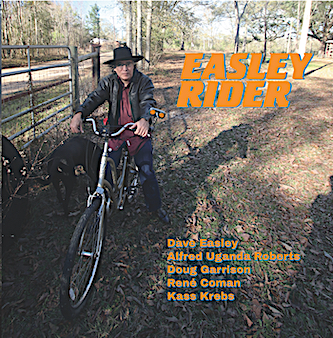 Well-known for his pedal steel guitar playing, Hawaii-born, Louisiana-based Dave Easley is an equally fine singer-songwriter with a strong penchant for guitar-centric rock in the spirit of the Grateful Dead, especially some of Jerry Garcia’s guitar and vocal mannerisms. That comparison is particularly evident on Dave’s 2020 album Easley Rider as well as his 2011 album A Time Of The Signs. Released at the start of 2020, the 13-cut Easley Rider CD was tragically overlooked as the devastating pandemic of 2020 rocked the music world.
Well-known for his pedal steel guitar playing, Hawaii-born, Louisiana-based Dave Easley is an equally fine singer-songwriter with a strong penchant for guitar-centric rock in the spirit of the Grateful Dead, especially some of Jerry Garcia’s guitar and vocal mannerisms. That comparison is particularly evident on Dave’s 2020 album Easley Rider as well as his 2011 album A Time Of The Signs. Released at the start of 2020, the 13-cut Easley Rider CD was tragically overlooked as the devastating pandemic of 2020 rocked the music world.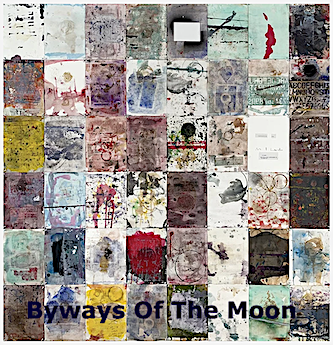 Compared with the rock sound on his 2020 Easley Rider album, Dave Easley’s 2021 LP release of Byways Of The Moon is another kettle of fish altogether. An all-instrumental showcase for Dave’s pedal steel guitar, and produced by Chris Schlarb for his Big Ego label, Byways Of The Moon is essentially a jazz album with Dave’s pedal steel guitar backed up by a fine band including Cathlene Pineda (Wurlitzer electric piano), Chad Taylor (drums) and Dave Tranchina (double bass).
Compared with the rock sound on his 2020 Easley Rider album, Dave Easley’s 2021 LP release of Byways Of The Moon is another kettle of fish altogether. An all-instrumental showcase for Dave’s pedal steel guitar, and produced by Chris Schlarb for his Big Ego label, Byways Of The Moon is essentially a jazz album with Dave’s pedal steel guitar backed up by a fine band including Cathlene Pineda (Wurlitzer electric piano), Chad Taylor (drums) and Dave Tranchina (double bass). 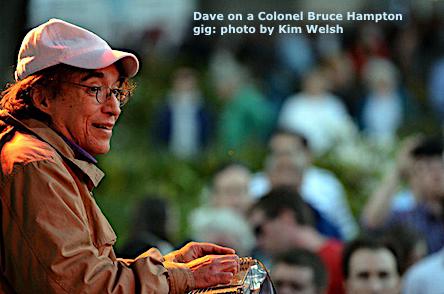 mwe3: Tell us where you were born, what states and other countries have you've lived in and where you live now and what you like about it?
mwe3: Tell us where you were born, what states and other countries have you've lived in and where you live now and what you like about it?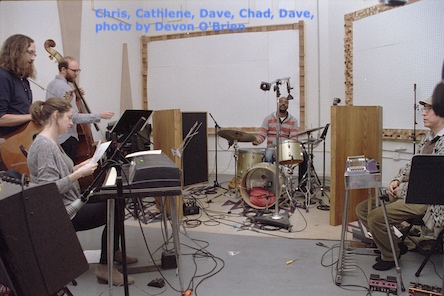 Dave Easley: I'd always wanted to play steel. I associated the instrument with my Hawaiian roots. The pedal steel has Hawaiian roots and I do as well though we've both changed a lot since then. When I first saw Chicago Bluesman Hound Dog Taylor, when I was around 14, on that particular night he did an unusual thing that I never saw him do again. He turned the guitar over and played overhanded like a Hawaiian player instead of underhanded like most slide players including himself.
Dave Easley: I'd always wanted to play steel. I associated the instrument with my Hawaiian roots. The pedal steel has Hawaiian roots and I do as well though we've both changed a lot since then. When I first saw Chicago Bluesman Hound Dog Taylor, when I was around 14, on that particular night he did an unusual thing that I never saw him do again. He turned the guitar over and played overhanded like a Hawaiian player instead of underhanded like most slide players including himself.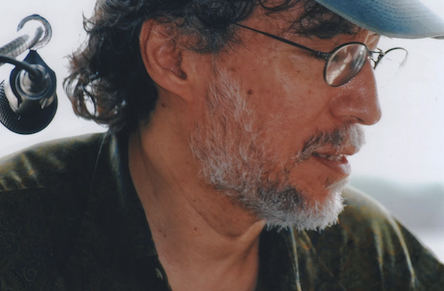 Dave Easley: About the time Easley Rider came out the whole world shut down. We all know why - the little microbe. That's just my luck. I was in the process of booking record release shows. But, of course, one day everything closed.
Dave Easley: About the time Easley Rider came out the whole world shut down. We all know why - the little microbe. That's just my luck. I was in the process of booking record release shows. But, of course, one day everything closed.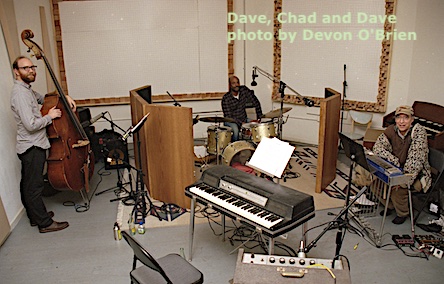 Dave Easley: On “I'm Crying” I got to play drums with Alfred, the two of us panned left and right and I think it's a groove that fits the song very well. I love it that he keeps playing through the breaks as the impetus of the rhythm, all except for the break where we sing the title. Then that makes the title line stand out when it's acapella.
Dave Easley: On “I'm Crying” I got to play drums with Alfred, the two of us panned left and right and I think it's a groove that fits the song very well. I love it that he keeps playing through the breaks as the impetus of the rhythm, all except for the break where we sing the title. Then that makes the title line stand out when it's acapella.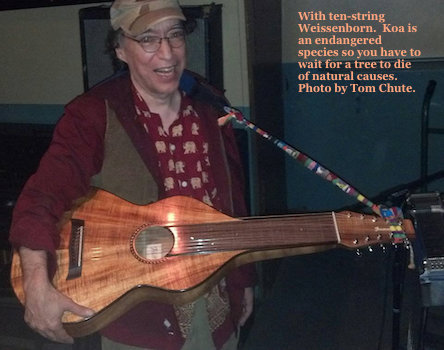 Dave Easley: There was a genuine case of serendipity with “Billionaires”. I had written it but did not yet have an arrangement. I was already done with recording “I'm Crying” and was mixing it. I had the stereo drums solo-ed up, me and Uganda. While I was working on that, with the “Billionaires” song in my head, I realized, hey, this same beat and tempo can work for both songs. I copied and pasted the drums. I called up Uganda and said, "I'm paying you for another song and you don't have to even get in your car. You already played it!"
Dave Easley: There was a genuine case of serendipity with “Billionaires”. I had written it but did not yet have an arrangement. I was already done with recording “I'm Crying” and was mixing it. I had the stereo drums solo-ed up, me and Uganda. While I was working on that, with the “Billionaires” song in my head, I realized, hey, this same beat and tempo can work for both songs. I copied and pasted the drums. I called up Uganda and said, "I'm paying you for another song and you don't have to even get in your car. You already played it!" 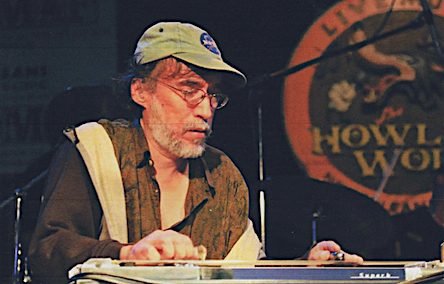 Dave Easley: Ben Mumphrey is the current proprietor of Studio in the Country where a lot of famous albums were made by Stevie Wonder, Kansas and many top groups. Ben is a great engineer and a great guy. He recorded the rhythm tracks with Doug, René and myself on 2 inch tape and then transferred them to computer so I could do vocals and overdubs at home. Then Ben and I mixed at Studio in the Country. Their reverb unit is the old fashioned type. It's a whole cavernous building. It's what the electronic reverbs are trying to imitate mathematically.
Dave Easley: Ben Mumphrey is the current proprietor of Studio in the Country where a lot of famous albums were made by Stevie Wonder, Kansas and many top groups. Ben is a great engineer and a great guy. He recorded the rhythm tracks with Doug, René and myself on 2 inch tape and then transferred them to computer so I could do vocals and overdubs at home. Then Ben and I mixed at Studio in the Country. Their reverb unit is the old fashioned type. It's a whole cavernous building. It's what the electronic reverbs are trying to imitate mathematically.